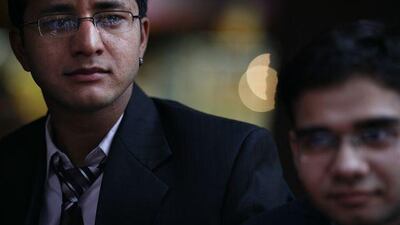NEW DELHI // Of all the cosmetic products lined up on the shelves of Shambhu Saran's pharmacy in South Delhi, there is one he knows he will never have a problem selling: skin-lightening cream. At about five every evening, a procession of young men and women come into his shop on the way home from work or school and buy one of the five different "fairness" creams he stocks.
"Fairness in just 15 days," promises one box, while another provides a small chart of 20 skin tones ranging from dark brown to pinkie white and guarantees a change of two tones in just one week. Mr Saran knows the products sell, but ask him if any of them really work and he simply laughs. "It's easy to sell because people think that fairer complexions are more beautiful," he said. "Nothing bought off-the-shelves can change your skin colour in three weeks."
He is not the only sceptic of late. Anbumani Ramadoss, India's health minister, singled out skin-lightening creams last week when he criticised "misleading" television commercials. He also wrote a letter to the information and broadcasting ministry, asking it to take action against such commercials and remove them from the air if necessary. "They should not be allowed to claim that within one week they can turn you from black to white, or to any other colour for that matter," said a spokesman for the minister. "If they want to say such things they have to provide scientific evidence."
Dr Ramadoss, nicknamed "Rambo" in the Indian media, has already ruffled feathers by launching campaigns against alcohol and fast food and introducing a smoking ban last year. Skin-lightening products, or "fairness" products, are also big business in India, where skin colour has traditionally been an indicator of caste, and therefore wealth and power. Complexion-lightening creams account for about half of India's nascent but booming skincare market, generating sales of US$200 million (Dh735m) annually, according to industry estimates.
Moreover, because of India's low literacy rates, television commercials have greater reach than ads in newspapers or magazines. Dr Ramadoss's move has struck a chord with many of India's equal rights campaigners and intellectuals who argue that the ads reinforce age-old prejudices by equating fair skin with beauty and getting ahead in life. Typically, skin-lightening ads follow the same formula: a person is unable to find a spouse or get a job because of their "dusky" hue, but after a short course of the cream their complexion lightens and their dreams are realised.
"It's almost racist," said Sudha Sundararaman, the general secretary of the All India Democratic Women's Association, which successfully lobbied to get an ad for Fair and Lovely, the market leader, taken off air in 2003. "The whole way fairness is touted as an ideal needs to be questioned." No one is sure of the origins of India's obsession with pallor. Some anthropologists say it is the result of multiple invasions over the centuries by paler-skinned peoples.
Others say it is simply a case of coveting what you do not have, in much the same way as a sun tan is valued among non-Indian Caucasians. In other Asian countries, such as Japan, China and South Korea, there is also a marked cultural preference for fair complexions. Makers of the creams insist they have evidence that their products work and say they are only responding to the realities of the Indian market.
Hindustan Unilever, which produces Fair and Lovely, says it supports Dr Ramadoss's comments because it can provide evidence for the claims it makes in its advertisements. But most dermatologists and doctors say the creams are little more than sunblock and their advertisements can encourage people to turn to potentially harmful bleaching agents. Other critics say the products fuel an unhealthy obsession with light skin, which in turn contributes to bigger problems, such as domestic violence, dowry demands and caste discrimination.
Last year, India's Supreme Court sentenced a man to two years in prison after his new wife killed herself over taunts of being "too dark". A look at the matrimonial classifieds in the Sunday newspapers shows how important colour is for many parents when it comes to finding a husband or wife for their child. Those who have darker skin also feel obliged to disclose that, describing themselves as "wheatish".
It is not just women who feel under pressure to whiten up. Three years ago, in response to research that showed up to one third of all sales of women's fairness creams were actually for men, India's Emami Group launched Fair and Handsome. "Fair skin attracts more girls," said Diyendu Rauthan, 21, a student of hotel management in Chandigarh, Punjab. He and his friends say they have used Fair and Handsome for two years, but they are still unsure it delivers on its promise.
"I just use it now because I like it." hgardner@thenational.ae

